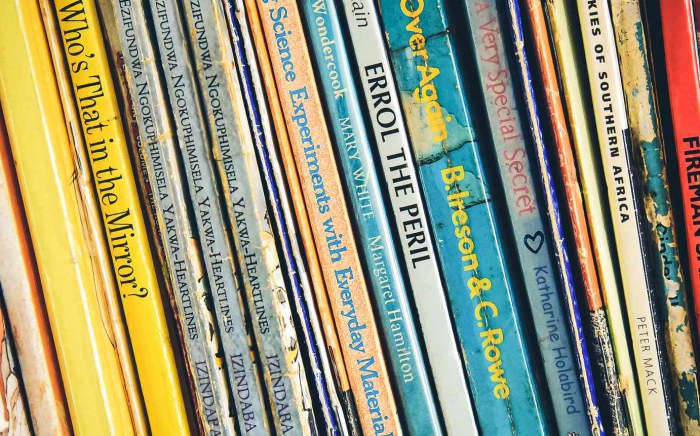If you weren’t there, ex-minister Pravin Gordhan encouraged writers to rise above ordinary events and draw the connections between them. That’s a pretty loaded statement considering he’s a man battling an insidious corruption at national level. He stood there like South Africa’s own Commissioner Gordan, the contemplative cop from Batman, but were his words really sage advice for the literati who wield their pens as swords?
To put you in the picture, Johannesburg’s Books and Blogs festival (#JozisBBF) is a two-year-old with keen eyes for social issues. The programme put literary elders alongside readers and aspirant writers in a series of workshops from which emerged a picture of what South Africans felt was worthy of expression.
Interesting, don’t you think, to look into that mirror?
Say Who?

Pravin Gordhan speaks at #JozisBBF. Image courtesy @StacyFru
In it you may find who Gordhan’s words were directed to, and a significant clue is blogs having had an equal footing with books at the festival. In publishing terms that’s the difference between short and long form content, and alludes to who reads what and why.
Take Tatoomypassport.com. It’s a travel-log with experiential guides for food, hotels and culture on the global open road. When I met its parents at the festival we got talking about how travel is a lot about exploring people. And since you can only see the world through your own eyeballs, you could say that travel is really the lifestyle of self-discovery. Like you could read a great book about Mexico, a la Stephen Fry, but that’s no substitute to flying over there.
Tatoomypassport is then a buffet of useful information for those running around with backpacks. And they’re usually younger.
Research confirms this with the observation that more content is consumed on the go using smartphones. These days, technology empowers such lifestyle choices, as opposed to say seniors who grew up believing that calculators make kids stupid. Why this is significant for a literary festival is because the mobile reading experience is vastly different to books.
That’s out of the closet on shootcake.com. The blogfolio showcases Saaleha Bhamjee’s photographs, and epitomizes how reading is changing. Pictures by definition are the shortest form of content ever. One glance and you’ve read the whole thing! I’ve also painted enough pictures to know that telling a story in just one frame is wildly suggestive to interpretation as opposed to the logic-driven delivery of text.
Instagram and Pinterest, ‘nuff said!
…It’s ironic actually that the youth are so thrifty with their time when it’s adults who are running over their two feet to get everything done in a day!
That’s not to say the youth don’t read, quite the contrary. It’s just that blogs tend toward non-fiction while books are far more emotive. You only have to sit through one installment of ‘Twilight’ to learn that the YA (Young Adult) market love emotional rollercoasters. Much of the fiction business in fact is built on the premise that people read to escape, and it is where they escape to that helps to make sense of Gordhan’s quip.
The South African Mind

“Bitter Fruit” by Achmat Dangor. Source: GoodReads.com
Let’s inspect the content featured in the ‘Role of Love in Stories’ session at JoziBBF, in which I was one of five authors talking about their books. These titles aren’t specifically targeted at YA but you are what you eat, so the content we consume as readers can tell you lots about who we are as a people.
Also, as an aside, love’s popular moniker is the colour red because of its intensely warm experience but our session happened in the ‘Blue Room’, a cool colour. I chuckled at first, wondering if that indicated a more objective stance on the drama that characterizes relationships, but therein was waiting for me a deep insight about the South African mind.
I suppose Zaheera Walker’s “Beautiful Chaos” is an apt way of titling it. Her book is a cross-class romance about bridging the racial divide, and story forms like those generally explore how humanity can overcome superficial prejudices. Historically, these stories come from changing social landscapes, obviously because you don’t fix anything unless it’s broken.
Classical books of the genre include “Heat and Dust” by Ruth Prawer Jhabvala. It won the Booker Prize for the understanding it brought to social differences when India’s colonization was at an end. Then there’s the period-piece symbolizing those British who became Americans. Millions swooned so deliriously to James Cameron’s blockbuster movie “Titanic” that it grossed over $2bn at the box office.
That’s how popular cross-class romances are, and you have to ask if we consume love stories because we’re preoccupied with differences?
Achmat Dangor’s “Bitter Fruit” is a story that shows where those differences probably come from. His tome is about a protagonist betwixt by moral right and wrong. The premise goes deep in the telling when a man runs into his apartheid tormentor after some time. Now would you forgive the beast who violated your wife in front you or avenge your loved one?
Of course Walker’s cross-class romance is drastically different from Dangor’s novel but they also share a striking similarity…
They’re both about the past!
Art Reflects Life
Underlying the racial differences that shaped this country is the very human argument of dignity, and that implies questioning the right and wrong approaches to life problems in order to grow as people.
In other words, change.
And change is confrontational. Since art reflects life, in storytelling lingo that’s a rite-of-passage narrative that the South African mind seems to be living now, today. Such stories then push buttons by way of asking why should you play your part in a county that tramps on you?
That’s the subtext of Gordhan’s loaded statement, and JoziBBF seems to have suggested that he’s not the only rebel in the house. He may be bald, but change is a blog-reading, smartphone wielding youthful impulse no matter what age you’re at.

Art-life or life-art? Panel Discussion at #JozisBBF. Source: Jozisbbf.com
Coincidence?
It doesn’t seem a coincidence either that such stories are coming out of South Africa.
Redemption plots featured heavily in our session, I think, because the rite-of-passage story form points thematically to the future. Ashleigh Giannoccaro’s “28 Boys” is a fine example. It’s the tale of a cape-flats gangster who seeks redemption from the only past he knows: violence. To construct her story, the love interest is a woman across the street who judges and shames him.
No, he’s not a masochist!
I felt a sissy when she told me how she ventured into the ghettos to go find that story. Her commitment to the craft is admirable because it’s the basis of telling an authentic story, more importantly it’s an investigation into the characters that populate the South African mind.

Ashleigh Giannocarro paying attention! Source: Jozisbbf.com
Similarly, the protagonist in “Being Kari” by Qarnita Loxton is a woman driven to revaluate her past amidst a betrayal in love. In returning to her estranged family she rediscovers herself and is born anew.
My own book, “Come Back Abayomi” is a political thriller with an interracial-romance as the B-story that’s triggered when one of those authentically African woman of modern values is kidnapped in a xenophobic attack. The xenophobia is driven by dogmatic old school values and the plot is a metaphor for moving past social issues that stem from seeing differences rather than similarities.
It would be interesting to see where all that stands in relation to some’s opinion that rehashing South Africa’s turbulent past has reached ad nauseam and is not helping anyone.
According to the Smashwords indie publishing survey, South African literature accounts for 1% of all indie books produced. Other 1% nations in the global content market include Ireland, Germany and Brazil. The common denominator is that they’re all nations with past conflicts rather similar to ours: independence from colonialism, guilt from a violent past, economic changes, and varying degrees of maturity since.
I wonder if they’re also still healing, or if we’re just doing it on African time!
The Rub…

Presidential contender in South African elections, Jacob Zuma, performs a tribal Zulu dance on stage during a rally in the Kwazulu Natal town of Empangeni. Picture by Peter Nicholls-The Times-16/04/09
From a storytelling perspective though, the creative choice to feature love in stories comes about when you’re trying to illustrate a path to reconnection. That’s why romance stories always have a complication. The lovers can’t get together until they overcome it and, until then, we writers blissfully tear them apart. It’s also why sex sells. Connecting with another human being implies trust.
And therein lies the rub:
Our attraction to love stories as South Africans suggests that we must think there is a lack of love here. I mean if readers of fiction do so to escape, and the place they escape to is sentimental, then the shoe fits. But you can only perceive a lack of love if you genuinely think that love is not just possible, but actually there. Otherwise you have nothing to benchmark the lack against.
That’s what the bleep happened at JoziBBF!
I suppose it discredits the idea that, with our eleven national languages, we’re still wanting of a national identity. Likewise, political babble about Indians being a thorn in South Africa’s side is also a load of tripe because they’re here changing with everyone else.
Through the eyes of love then, Gordhan’s quip seems likely to have been made in the context of his own struggle for justice. Or maybe not. I can’t speak for him. What I can say is that his was not sage advice, just a standard one because writers connect disparate ideas to create meaning by default. That’s what a story-form is, a range of fictional life-events arranged in a specific way to create meaning.
Love is youthful!
And that’s what made JoziBBF a pretty cool event, you could see the connections being made. The most diverse demographic wasn’t in attendance but it was creeping in. It was youthful and fun, like love, and love is a preoccupation of youth.
Older people can’t love. They know better. They are accepting and compassionate instead, which is higher than love. Besides, the twilight years don’t leave enough energy to passionately throw a vase at a jilted lover, and that’s if you can even remember who your lover is!
…but I kid!
If literary elders communing with aspirant youth at JoziBBF were the polarities that represented an understanding of the past and a view to the future respectively, then what emerged was the picture of change that the South African mind seems to be wanting.
It sure puts Gordhan’s comments into perspective, and the truth is we’re not the only ones who think it’s time to rid ourselves of old baggage.
Romance accounts for 49% of all fiction sold globally and fiction is a whopping 87.5% of all indie literature sold. We’re evolving parallel to the global mind of humanity.
See, differences can really be so superficial.

The ‘Role of Love in Stories’ session at #JozisBBF
Where To Now?
I for one look forward to where that dynamic takes JoziBBF because the festival gave me ample content opportunities. I could see my audience, which is a difficult thing for a writer when you’re chained to your desk milling out the words. Mostly, a larger audience could help beget answers for publishing questions other indie authors like me have…
Like what length, formats and price-point to aim at to make literature more accessible to South Africans? Pricing and distribution is an inclusive strategy I think to deal with those pesky social issues, and is a productive change from this country’s divided past. It’s also the ultimate act of love us authors engage in with our audiences.
These questions and more I think JoziBBF can fulfil in its future iterations. I see it becoming a functional part of the local publishing machine, a content aggregator in the long tail of choices that characterizes our industry. In Malcolm Gladwell parlance, a ‘maven’ and tastemaker of South African literature.
But forget all that bookish stuff. Just seeing the South African mind in action is better than TV. Attend a JoziBBF and you’ll see what I mean.
- Footnote: Not mentioned in this review is the novel “Her heart” by Tumelo Moleleki, who also contributed generously of her experience and work to our session at JoziBBF. Be sure to check her out too.




Leave a Comment